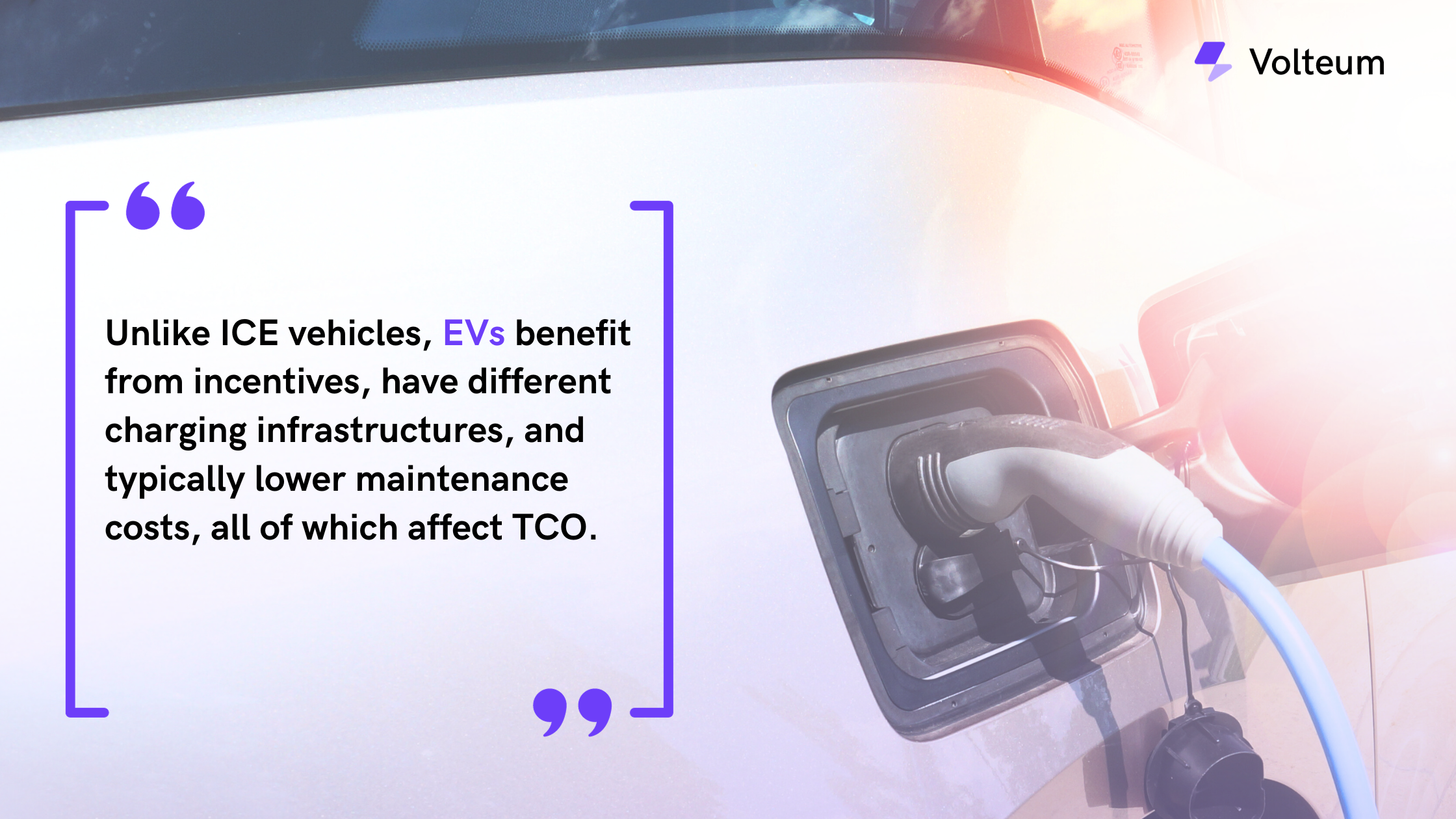Calculating the TCO of an electric vehicle: A comprehensive guide
Aug 08, 2023 · 6 min read · blog
The adoption of electric vehicles has been accelerating rapidly, thanks in part to growing environmental concerns, technological advancements, and government incentives. For businesses and individuals alike, understanding the total cost of ownership (TCO) for EVs is vital when making a purchase decision. However, calculating TCO for EVs is fundamentally different from internal combustion engine (ICE) vehicles. Here's a deep dive into the nuances of EV TCO calculation.

Why EV TCO calculation differs from ICE TCO calculation

EVs and ICE vehicles differ significantly in their mechanisms, maintenance needs, fueling costs, and benefits. Therefore, TCO calculations for both vary. Unlike ICE vehicles, EVs benefit from incentives, have different charging infrastructures, and typically lower maintenance costs, all of which affect TCO.

Main considerations for TCO

When calculating the TCO of an electric vehicle, it's essential to factor in whether you're planning to purchase, lease, or rent the vehicle. This decision plays a pivotal role in determining the TCO. Furthermore, you should account for your preferred charging options. Whether you're charging at home, while on the move, or at your workplace can significantly influence electricity costs. Finally, your typical vehicle usage patterns, such as average mileage, trip lengths, and the proportion of city versus highway driving, will determine your overall electricity consumption and, consequently, the cost.

Elements of the TCO

The initial purchase price or financing of the EV is the most evident component of the TCO. Additionally, fuel costs for EVs, which are essentially your charging costs, can vary based on charging location and the prevailing electricity rates. Maintenance costs are also a crucial element, though they tend to be lower for EVs, given they have fewer moving parts. Insurance rates may differ based on the specific EV model and your geographical location. Also, don't overlook potential battery replacement costs, especially if the battery's capacity decreases notably over time. Lastly, if you're investing in personal charging infrastructure, the installation and equipment expenses should also be factored into the TCO.

Residual value calculation

Understanding the residual value of an EV is crucial, primarily because it reflects the vehicle's worth at the end of its life or lease period. This value helps in estimating future benefits, should you decide to sell or trade the vehicle. Unlike ICE vehicles, which have a well-established market and history to derive their residual values, EVs, being relatively newer to the market, can be more unpredictable in this aspect. To calculate the residual value of an EV, one should consider factors like the vehicle's age, overall condition, mileage, and the health of the battery. An additional consideration is the advancement in battery technology, which may affect older models' desirability. Generally, industry reports and market analyses provide a good starting point to estimate an EV's residual value.



Charging cost calculation

Determining the charging cost involves a few variables. You must first understand your vehicle's charging efficiency and match that with the electricity rate, which varies by location and provider. The type of charger also plays a role. For instance, Level 1 chargers, commonly used for home charging, take longer and might be less efficient than Level 2 or DC Fast Charging stations. However, they might be cheaper in terms of infrastructure setup. To estimate the charging costs, you'd need to multiply the kWh consumption of your vehicle by the electricity rate, factoring in the type of charger used and its associated costs.

Maintenance costs

Electric vehicles have revolutionized maintenance costs. With fewer moving parts than ICE vehicles, wear and tear are generally reduced, leading to maintenance costs that can be up to 30% less compared to traditional vehicles. For instance, EVs don't require oil changes, and brake systems tend to last longer due to regenerative braking systems. However, potential battery replacements or repairs can offset some of these savings, so it's crucial to consider the entire vehicle's maintenance landscape.

Incentives and other cost savings

The allure of electric vehicles is not just limited to their environmental benefits. Various incentives designed to promote the adoption of EVs can significantly influence the total cost of ownership, like tax credits, rebates, reduced registration fees, direct purchase incentives, charging station incentives, exemption or reduction in ULEZ/LEZ charges, toll and parking reductions, special loans and financing options and carpool lane access. Find out more about all the important incentives here.

Other costs to consider

Apart from the apparent costs, there are hidden or less obvious expenses associated with EV ownership. Infrastructure costs, especially for those opting for high-speed home charging solutions, can be substantial. There's also the potential decrease in battery efficiency over time, leading to diminished range and possibly necessitating a battery replacement. Furthermore, while EVs generally boast a longer lifespan, parts replacement or repairs outside warranty periods can be pricier than traditional vehicles due to specialized components.

How can you calculate TCO in less than a minute accurately?

Understanding the TCO of an electric vehicle can be complex due to the various factors involved. However, this knowledge is vital for making informed decisions about EV adoption, whether you're an individual or a business. For those looking to simplify this process, Volteum offers an automated solution. Our platform considers all these elements, making TCO calculations straightforward and accurate. Contact us today to get your personalized TCO calculation and analysis for any of your fleet vehicles.